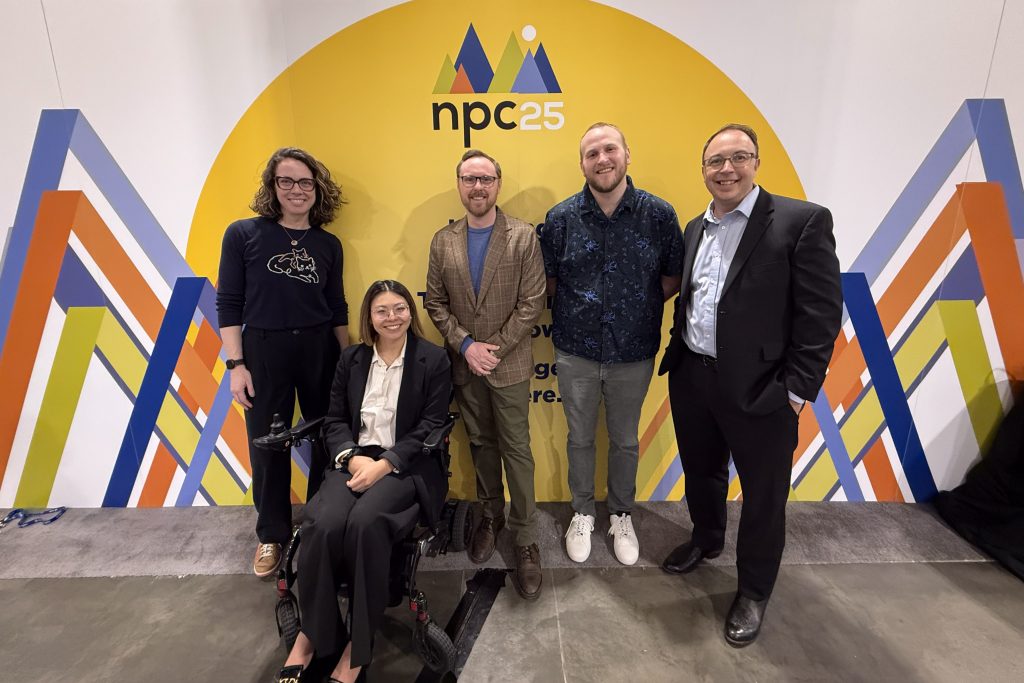By Ines Aviles-Spadoni, M.S., M.A., UFTI Research & Communications Coordinator

Ian Moore, a student in the online Master of Urban and Regional Planning (MURP) degree program at UF, won second place in the American Planning Association’s (APA) Transportation Planning Division Student Paper Competition for his paper titled “A Review of the Socioeconomic Impacts of Alaska’s Unique Transportation Infrastructure.” Moore received the award during the recent National Planning Conference in Denver, Colorado which was held March 29 to April 1.
“Receiving an award from the American Planning Association for my research and writing has been both a personal and a professional validation of my efforts and will continue to motivate me as I approach the end of this program,” Moore said.
The paper was written as an assignment in URP 6716 – Transportation Policy and Planning, a course taught by Ruth Steiner, Ph.D., a professor in UF’s Department of Urban and Regional Planning. Steiner is also a long-time affiliate of the University of Florida Transportation Institute (UFTI) and reflected on her students’ achievement.
From the first time we discussed the paper, I knew it was going to be different than the papers of other students,” Steiner said. “Throughout the years, few students have written papers on air travel. Ian’s paper is unusual in that it looks at a mode of travel that is essential to the economic and social well-being of residents throughout Alaska.”
As a graduate student in the MURP program, Moore also works as an airport planner for the Alaska Department of Transportation and Public Facilities (Alaska DOT and PF) at the Ted Stevens International Airport. For this assignment, he decided to focus on equity and fairness in transportation because he had been interested in these issues and thought it was important to understand how they fit into the overall transportation system. Furthermore, he wanted to explore how his work as an airport planner could inform the socioeconomic impacts of Alaska’s transportation infrastructure.
Alaska’s topography and oftentimes limited road infrastructure make air travel an important mode of transportation for many communities. Moore’s paper takes a look at the Alaskan air travel landscape and focuses on accessibility for various socio-economic groups. His research paper found that simply having access to air travel doesn’t necessarily mean that Native Alaskan and lower-income communities will have better outcomes. What is important to consider are the social and economic challenges faced by these communities and what might prevent an improved transportation system from making a difference.
“I considered whether better air connectivity leads to improved socioeconomic outcomes like higher income, employment, and education levels,” he said. “Surprisingly, the correlation was minor, especially for Alaska Native communities who often didn’t benefit despite being relatively well connected to air services. This points to deeper equity issues in Alaska’s transportation system.”
Through this paper, Moore hopes that transportation and planning professionals will consider “less resource-intensive and more cost-effective substitutions” such as installing better broadband internet access for rural and less connected communities for a better return on investment compared to costly and underutilized physical transportation solutions.
“The high cost and long development time for infrastructure such as additional airports and passenger routes means that we need to be considering more cost-effective alternative solutions that can generate a meaningful impact much more quickly and efficiently,” Moore said.
Steiner was instrumental in developing Moore’s paper and provided valuable guidance throughout this journey, serving as a sounding board as he began his research process and refined his own ideas.
“She really helped me think through my ideas, especially as I came across new information and worked to narrow my focus and define a clear research question,” he said. “Dr. Steiner’s knowledge of where to find transportation data and resources to support my research was incredibly valuable.”
In 2023, Moore began his graduate studies in the online MURP program. His goal was to build a strong theoretical and practical background in urban planning and to accelerate a career transition into the field by developing a portfolio of work showcasing his expertise.
As for what this award means for Moore’s career goals and aspirations, it not only validates the work he is currently doing at the Alaska DOT and PF, but it is a strong motivator as he continues to grow in his career as an airport planner.
“I think it’s important to feel appreciated in your field, and receiving recognition from a professional association like the American Planning Association’s Transportation Planning Division is really encouraging,” he said. “It reinforces that the work I’m doing has value, and it keeps me focused and inspired to keep learning, growing, and contributing.”
